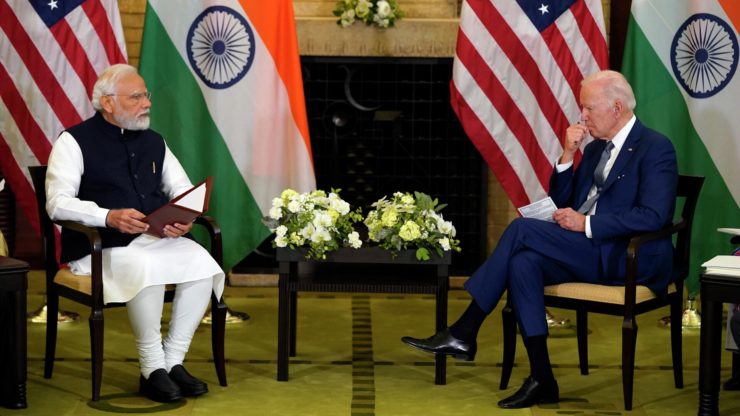
The United States leadership is squirming to resolidify ties with parts of the world that either bombed, invaded, or marginalized in recent decades. The prime example of marginalization is India. However, without the current gigantic trade surpluses boosting Indian confidence in America, Prime Minister Narendra Modi will have to do much less tightrope-walking between Washington and the emerging multipolar world. Since the end of the Cold War, India has practiced a multi-aligned foreign policy. This may soon change.
It’s no secret that Indian businesses are raking in billions on discounted Russian crude oil. According to the latest reports, Indian refiners saved over $7.17 billion in foreign exchange in the 14 months which ended in May 2023. Russian tankers flood India’s Gulf of Kutch, home to the world’s biggest refining operation. Ironically or poetically, India then ships refined oil to markets like the European Union at a hefty value-added price. If the trend goes unchecked, India will surpass Saudi Arabia as the largest oil exporter to the EU.
Changing gears. Russian Foreign Minister Sergey Lavrov said recently that Iran will be formally approved as a member of the regional Shanghai Cooperation Organization with China, Russia, and Central Asian countries. Iran also has sights on becoming a member of the BRICS. India is a member of both organizations. This organization represents about 40% of the world’s population, 20% of the world’s GDP, and 60% of the Eurasia landmass. This quote from a CBS News report frames what’s taking place:
“China’s Xi Jinping urged the leaders of Russia, Iran, and other allied allies to boost ties and resist Western sanctions on Tuesday as the leaders of the Shanghai Cooperation Organization met virtually for a summit hosted by India. The Shanghai alliance encompasses a vast stretch of the globe from Moscow to Beijing and includes around half the world’s population when observer and “dialogue partner” nations are included.”
Along with Russia, China, India, and new member Iran, the other full members of the trade and security alliance are Kazakhstan, Kyrgyzstan, Pakistan, Tajikistan, and Uzbekistan. According to the meetup reports, Belarus will become a member at the next SCO summit.
Then there’s the news that the International North-South Transport Corridor (INSTC), Iran, Russia, and India, gathered for the third time in Tehran recently to discuss solutions for promoting freight transit through the newly developed international corridor. Created in 2000 by Iran, Russia, and India, this 7,200-km-long INSTC works as a multi-modal network of ship, rail, and road routes for moving freight between India, Iran, Azerbaijan, Russia, Central Asia, and Europe.
Finally, outside some BBC cheerleading of the “accomplishments” of the recent Biden-Modi meetup in Washington and TIME Magazine harping about human rights detente failures, all the U.S. came away with were a microchip manufacturing investment deal and a U.S. jet engine promise for India made planes. Meanwhile, Russia remains the dominant supplier of Indian arms, and the nations of the aforementioned Eurasian kind show great interest in the growing Indian middle class. Joe Biden has many propaganda channels cheering for the hegemony, but the clear trend is away from a U.S.-controlled Earth.
Phil Butler, is a policy investigator and analyst, a political scientist and expert on Eastern Europe, he’s an author of the recent bestseller “Putin’s Praetorians” and other books. He writes exclusively for the online magazine “New Eastern Outlook”.